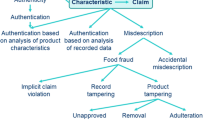Abstract
Background
The safety and efficacy of dietary supplements is of growing concern to regulators, health-care providers and consumers. Few scientific data exist on clinical effects and potential toxicities of marketed products. Harmful supplements may not be identified for months or years with existing adverse event monitoring mechanisms. Retrospective review of poison center statistics to capture supplement-associated toxicity also has limitations.
Methods
We collaborated with the FDA Center for Food Safety and Nutrition (CFSAN) to conduct a 1-year prospective surveillance study of dietary supplement-related poison control center calls in 2006. Prompt follow-up of symptomatic cases, laboratory analysis of implicated dietary supplements, and causality assessment by a case review expert panel were performed.
Results
Of 275 dietary supplements calls, 41% involved symptomatic exposures; and two-thirds were rated as probably or possibly related to supplement use. Eight adverse events required hospital admission. Sympathomimetic toxicity was most common, with caffeine products accounting for 47%, and yohimbe products accounting for 18% of supplement-related symptomatic cases. Suspected drug-herb interactions occurred in 6 cases, including yohimbe co-ingested with buproprion (1) and methamphetamine (3), and additive anticoagulant/antiplatelet effects of NSAIDs taken with fish oils (1) and ginkgo (1). Laboratory analysis identified a pharmacologically active substance in 4 cases; supplement toxicity was ruled unlikely when analytical testing was negative in 5 cases.
Conclusion
Most supplement-related adverse events were minor. Clinically significant toxic effects were most frequently reported with caffeine and yohimbe-containing products. Active surveillance of poison control center reports of dietary supplement adverse events enables rapid detection of potentially harmful products, which may facilitate regulatory oversight.
Similar content being viewed by others
References
Bent S, Kane C, Shinohara K. et al. Saw palmetto for benign prostatic hyperplasia.N Engl J Med 2006;354(6): 557–566.
Turner RB, Bauer R, Woelkart K et al. An evaluation of Echinacea angustifolia in experimental rhinovirus infections.N Engl J Med 2005;353(4):341–348.
Newton KM, Reed SD, LaCroix AZ et al. Treatment of vasomotor symptoms of menopause with black cohosh, multibotanicals, soy, hormone therapy, or placebo: a randomized trial.Ann Intern Med 2006;145(12):869–879.
Clegg DO, Reda DJ, Harris CL et al. Glucosamine, chondroitin sulfate, and the two in combination for painful knee osteoarthritis.N Engl J Med 2006;354(8):795–808.
Hepatic toxicity possibly associated with kava-containing products—United States, Germany, and Switzerland, 1999–2002.MMWR Morb Mortal Wkly Rep 2002;51(47):1065–1067.
Favreau JT, Ryu ML, Braunstein G et al. Severe hepatotoxicity associated with the dietary supplement LipoKinetix.Ann Intern Med 2002;136(8):590–595.
Final rule declaring dietary supplements containing ephedrine alkaloids adulterated because they present an unreasonable risk. Final rule.Fed Regist 2004;69(28):6787–6854.
Dietary Supplements: A Framework for Evaluating Safety Institute of Medicine and National Research Council. Washington, DC: The National Academies Press,2005.
Norred CL, Finlayson CA. Hemorrhage after the preoperative use of complementary and alternative medicines.Aana J 2000;68(3):217–220.
Haller CA, Benowitz NL, Jacob P III. Hemodynamic effects of ephedra-free weight-loss supplements in humans.Am J Med 2005;118(9):998–1003.
Mansergh G, Shouse RL, Marks G et al. Methamphetamine and sildenafil (Viagra) use are linked to unprotected receptive and insertive anal sex, respectively, in a sample of men who have sex with men.Sex Transm Infect 2006;82(2):131–134.
Bizzarini E, DeAngelis L. Is the use of oral creatine supplementation safe?J Sports Med Phys Fitness 2004;44(4):411–416.
Robinson SJ. Acute quadriceps compartment syndrome and rhabdomyolysis in a weight lifter using high-dose creatine supplementation.J Am Board Fam Pract 2000;13(2):134–137.
Greenwood M, Kreider RB, Melton C et al. Creatine supplementation during college football training does not increase the incidence of cramping or injury.Mol Cell Biochem 2003;244(1-2):83–88.
Santos RV, Bassit RA, Caperuto EC. et al. The effect of creatine supplementation upon inflammatory and muscle soreness markers after a 30km race American College of Sports Medicine roundtable. The physiological and health effects of oral creatine supplementation.Life Sci 2004;75(16):1917–1924.
Bent S, Goldberg H, Padula A. et al. Spontaneous bleeding associated with ginkgo biloba: a case report and systematic review of the literature.J Gen Intern Med 2005;20(7): 657–661.
Ang-Lee MK, Moss J, Yuan CS. Herbal medicines and perioperative care.JAMA 2001;286(2):208–216.
Ciocon JO, Ciocon DG, Galindo DJ. Dietary supplements in primary care. Botanicals can affect surgical outcomes and follow-up.Geriatrics 2004;59(9):20–24.
Author information
Authors and Affiliations
Corresponding author
Rights and permissions
About this article
Cite this article
Haller, C.A., Kearney, T., Bent, S. et al. Dietary supplement adverse events: Report of a one-year poison center surveillance project. J. Med. Toxicol. 4, 84–92 (2008). https://doi.org/10.1007/BF03160960
Issue Date:
DOI: https://doi.org/10.1007/BF03160960




